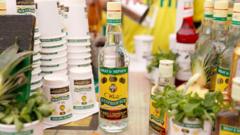The ongoing conflict surrounding the definition of Jamaican rum has sparked a heated discussion in the Caribbean, pitting local distilleries against each other.
**What Truly Defines Jamaican Rum? Legal Battle Over Identity Heats Up**

**What Truly Defines Jamaican Rum? Legal Battle Over Identity Heats Up**
As Jamaican rum's cultural identity is scrutinized, key players debate its future amidst legal disputes.
In Jamaica, a legal dispute is shaking the foundations of rum identity, as producers argue over what constitutes “Jamaican rum.” The conversation has intensified following a decision by Jamaica's Intellectual Property Office (JIPO) to tighten rules linked to the rum's geographical indication (GI). This ruling, which prohibits aging rum overseas, seeks to bolster the protection of the product in export markets, especially the EU and the US.
The Spirits Pool Association (SPA), representing six local distilleries, including notable brands like Appleton and Hampden Estate, feels the amendments are crucial for enhancing Jerlian rum's reputation as a premium product. They believe it's vital that rum is aged within Jamaica to preserve its authenticity and adhere to the standards expected of it.
However, the ruling has alarmed National Rums of Jamaica (NRJ), a major player that controls significant distilleries. NRJ argues that the traditional approach of aging rum abroad should still qualify as Jamaican rum, citing a rich history of such practices. This company, which operates under the ownership of the Jamaican government and international partners like Demerara Distillers, states that the changes could jeopardize its business model.
With a hearing set for April 28, the NRJ aims to challenge the JIPO ruling, emphasizing that Jamaican rum should include products that have been aged in foreign locations—a significant departure from the SPA’s firm stance on aging domestically.
Supporters of the SPA argue that exclusive aging processes offer economic benefits to Jamaica, enhancing local jobs and boosting rum tourism. Christopher Gentles, the SPA’s general manager, reflected the association's viewpoint, stating that authenticity is lost when aging occurs outside Jamaica.
The legal debate echoes similar tensions in neighboring Barbados, where rum distilleries confront similar issues over geographical classification and export rights. Like Jamaica, Barbados also seeks to enhance the value of its rum through GI protections, yet one entity, Wird, has voiced objections that mirror challenges faced by Jamaican producers.
The profits and prestige associated with GI products—documented to command significantly higher market prices—further underline the urgency of these discussions. As the Jamaican rum industry strives for recognition and respect, participants on both sides hope to find a compromise that serves the interests of local producers and preserves their heritage.
With passion for a uniquely Jamaican product at stake, the rum industry’s future is keenly watched as stakeholders articulate their visions and navigate this intricate legal landscape.
Jamaica's storied relationship with rum, as highlighted in national media, underlines the importance of safeguarding it against perceived appropriation by foreign investors, ensuring its legacy remains rooted in its homeland.
The Spirits Pool Association (SPA), representing six local distilleries, including notable brands like Appleton and Hampden Estate, feels the amendments are crucial for enhancing Jerlian rum's reputation as a premium product. They believe it's vital that rum is aged within Jamaica to preserve its authenticity and adhere to the standards expected of it.
However, the ruling has alarmed National Rums of Jamaica (NRJ), a major player that controls significant distilleries. NRJ argues that the traditional approach of aging rum abroad should still qualify as Jamaican rum, citing a rich history of such practices. This company, which operates under the ownership of the Jamaican government and international partners like Demerara Distillers, states that the changes could jeopardize its business model.
With a hearing set for April 28, the NRJ aims to challenge the JIPO ruling, emphasizing that Jamaican rum should include products that have been aged in foreign locations—a significant departure from the SPA’s firm stance on aging domestically.
Supporters of the SPA argue that exclusive aging processes offer economic benefits to Jamaica, enhancing local jobs and boosting rum tourism. Christopher Gentles, the SPA’s general manager, reflected the association's viewpoint, stating that authenticity is lost when aging occurs outside Jamaica.
The legal debate echoes similar tensions in neighboring Barbados, where rum distilleries confront similar issues over geographical classification and export rights. Like Jamaica, Barbados also seeks to enhance the value of its rum through GI protections, yet one entity, Wird, has voiced objections that mirror challenges faced by Jamaican producers.
The profits and prestige associated with GI products—documented to command significantly higher market prices—further underline the urgency of these discussions. As the Jamaican rum industry strives for recognition and respect, participants on both sides hope to find a compromise that serves the interests of local producers and preserves their heritage.
With passion for a uniquely Jamaican product at stake, the rum industry’s future is keenly watched as stakeholders articulate their visions and navigate this intricate legal landscape.
Jamaica's storied relationship with rum, as highlighted in national media, underlines the importance of safeguarding it against perceived appropriation by foreign investors, ensuring its legacy remains rooted in its homeland.



